Create positive remote work culture with 11 easy strategies
Remote Working - Numbers
The global economy saw a massive setback in 2020 due to the coronavirus pandemic. Businesses had to implement a partial or complete remote model to survive the crisis without hiccups.
Companies gradually realized that a strong remote team could improve productivity and profitability, shaping the future of remote work. America expects to have 36.2 million employees working remotely by 2025. And, it is not surprising that 74 percent are willing to quit their office jobs for remote positions, underlining the increasing appeal and importance of remote work culture in today's workforce.
What Is Remote Work Culture?
Remote work culture refers to the shared values, norms, and practices that shape the remote work experience within an organization. It encompasses aspects such as trust, flexibility, work-life balance, and strong communication.
Building a positive remote work culture involves promoting trust and transparency, encouraging virtual team-building activities, fostering a healthy work-life balance, and supporting employee well-being. Remote work culture plays a vital role in ensuring the success and satisfaction of remote employees.
RaftLabs understands the importance of a positive environment, managing remote employees, and cultivating a strong remote work culture. By implementing some simple strategies and tips, you can create a thriving remote team that excels in productivity and collaboration.
Why Remote Work?
RaftLabs is a fully remote team company. Let us help you understand some strategies and tips that have worked for us and can work for you too.
These tips can guide you on how to build a strong culture with a remote team:
1. Welcoming New Employees
Virtual onboarding process
Ensure team members know the new joiners before the call. Set up the welcome call for every new employee. Make them feel comfortable by having a few team members on that call. Let team members introduce themselves first to break the ice. Make it personal by talking about individual aspects on the first call. Let them have a sense of belonging.
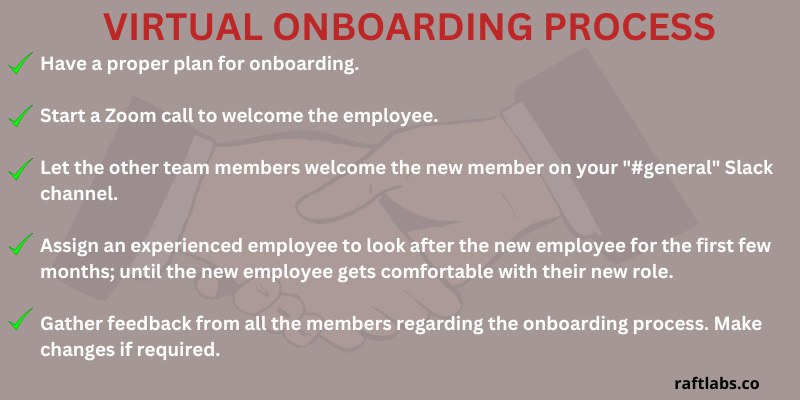
2. Managing Remote Employees
Managing remote employees requires effective communication and collaboration. Provide clear guidelines and expectations to remote employees. Establish regular check-ins and meetings to discuss progress and address any concerns.
Foster open and transparent communication channels to ensure everyone is on the same page. Encourage autonomy and trust while providing support and resources when needed. Recognize and appreciate remote employees' contributions to maintain a positive work environment.
3. Collaboration Tools For A Remote Team
Encourage your virtual workforce to use different project management tools for better communication and to foster a positive environment and remote work culture.
Collaboration tools for a remote team
These tools can increase employee engagement and help shape how new employees will feel and think about your organization.
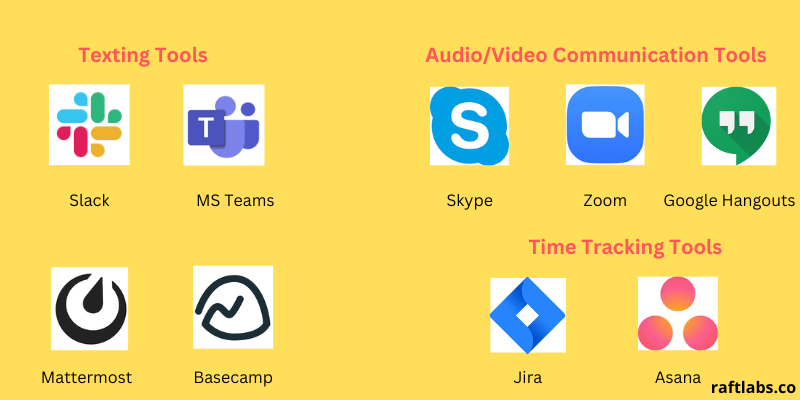
Communication (Text/Audio/Video) Tools:
Texting is an effective method for better team communication. Urge your remote staff to create concise messages. The receiver must understand the issue or assignment quickly.
Let us find some of the best tools for texting in the virtual workplace:
Virtual meeting platforms promote team participation. Use these video or audio communication tools for remote teams:
Task Tracking Tools: The task tracker tools keep everyone on the right track. Let your remote team manage their tasks more effectively with the below tools:
4. Define A Proper Work Procedure
Guide your team by setting clear task guidelines. List down step-by-step instructions showing how to proceed with a task. It will help to complete the whole project by meeting the SLA target.
Explain the project's goal by designing a project brief before assigning the tasks. Include the following details in the information:
Goal of the project
Budget
Deliverables
Project Timeline
Final plan
By dividing and assigning tasks to each team member, you promote collaboration and teamwork. Implementing these small tips will help your company achieve significant milestones in the future of remote work.
Additionally, it is important to consider how you define a healthy work-life balance. Encourage your team members to set boundaries, prioritize self-care, and maintain a separation between work and personal life. Supporting their well-being will contribute to a positive work environment and overall productivity.
5. Team Communication Is Crucial
Communication plays a vital role in the success of remote teams. Establishing a recurring and concise communication process is essential for any remote working team.
By maintaining regular interaction with subordinates, you demonstrate that they are cared for and supported by the management. This approach fosters an environment where team members feel comfortable expressing their shortcomings or addressing work-related issues. Such a culture promotes healthy work relationships and contributes to a positive work environment.
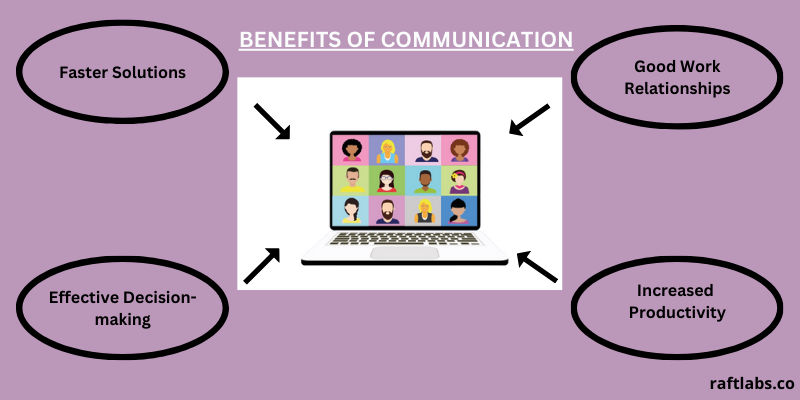
Benefits of team communication in a remote environment
Workplace values shape the future of remote work. By emphasizing effective communication, clear task guidelines, and project briefs, you reinforce the importance of these values within your organization.
Furthermore, prioritizing team communication and providing support to remote employees increases employee engagement. When employees feel valued and supported, they are more likely to contribute to the company's success by actively participating in projects, sharing ideas, and delivering high-quality work.
By implementing proper work procedures and nurturing a culture of effective communication, your company can pave the way for the future of remote work, create a positive work environment, and harness the full potential of your remote team.
6. Ensure Transparency
Encourage group messaging so all members are on the same page. Every team member should be able to access almost every file or document of the project equally.
Promote clear communication to ensure overall transparency in the workspace. It allows your team leaders to lead you on the right path. Leave no room for assumptions or doubts.
7. Power Of Written Communication
Are there introverts at your workplace?
The members of a team will have different personalities. Introverts prefer text messages to video conferencing. Texting saves time and can be less stressful. Well-crafted text messages are more powerful than you think.
Convey the relevance of writing a clear and focused message to employees.
Noting down meeting minutes records essential details discussed in a meeting. Likewise, employees can make brief notes summarizing their daily work.
8. Working Around Time Zones
If the team members connect from different countries, choose an overlapping time to work together. If you work from India and your colleague is joining from the UK, the best time to schedule meetings is between 1:30 PM - 6:00 PM (IST). To pick the suitable timings, you can use the below tools:
If there is no overlapping time to work together, create a template where you can note down your status. It helps the other to start the work from where you left off. You can include the following points in the template:
1. Status of work you did yesterday.
2. Work planned by you today.
3. Are there any blockers?
It helps in effective team communication where the work schedules don’t match. Still, the team must have a system to hold emergency meetings to address any problematic issues.
9. Virtual Water Cooler Meetings
Who doesn't love having a chance to leave all the work stress and have fun?
Everyone loves to relax after a hectic work schedule. Organize weekly "water cooler" meetings. Employees can enjoy casual, light-hearted conversations during these meetings. Let them take part in fun online activities or games. It strengthens team bonding.
10. Employee Recognition
Benefits of employee recognition programs in the working environment
Appreciation from the employer motivates the staff to give better results. Try acknowledging their dedication. You will find that they will be glad to work at their full potential.
Provide bonuses and promotions on time to value an employee's effort. A happy employee is a productive employee.
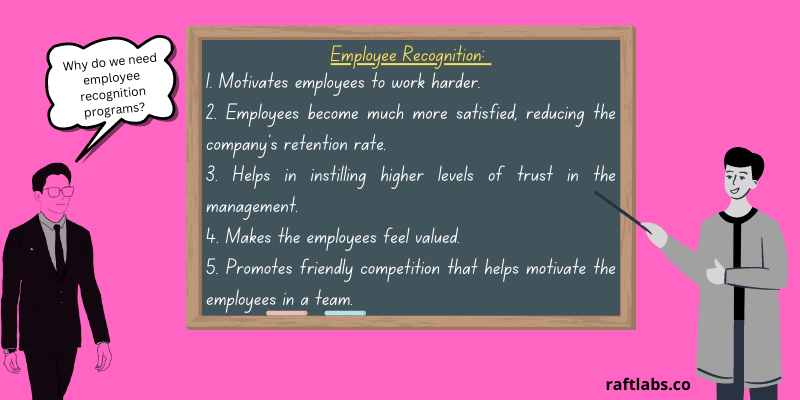
11. Maintain Healthy Work-Life Boundaries
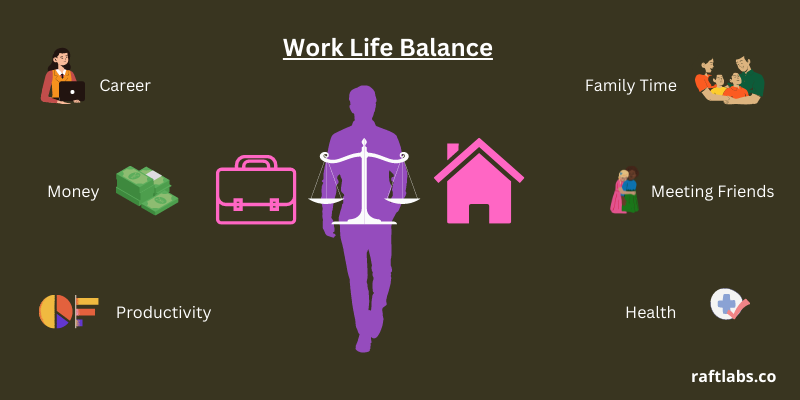
Remote workers tend to work longer hours. It can affect their work-life balance. Encourage your remote staff to have a boundary between work and personal life. Make them aware of self-care. The mental health of employees is crucial. A peaceful workspace builds a positive environment for a remote work culture.
Top 5 Successful Remote Companies
The below companies have proved that having a remote work routine can create a positive company culture:
Industry: Publishing & E-commerce
Revenue: $171.5M
Industry: eLearning
Revenue: $24.6M
Industry: Software Development
Revenue: $14M
Industry: Social Media Management
Revenue: $13.6M
Industry: Technology
Revenue: $140M
On A Final Note
A complete remote office setup can appear challenging and intimidating for companies. However, as described in the article, implementing the proper strategy and developing a healthy company culture are essential to creating a positive environment. Many reputable tech companies like Apple, Red Hat, and others are embracing hybrid and fully remote work models.
At RaftLabs, a software company based in Ireland, we operate with an entirely remote team and have successfully built a joyful and productive remote work culture. Our employees enjoy a healthy work-life balance and feel connected to the company's values and mission. We understand that employees play a critical role in contributing to the company's success.
How employees contribute to the company's success:
Our employees at RaftLabs contribute to the company's success by bringing their expertise, creativity, and dedication to every project they undertake. Through their hard work, innovation, and collaboration, they deliver high-quality solutions that meet and exceed client expectations. Their contributions not only drive the company's growth but also foster a positive work environment where everyone feels valued and empowered.
How to Create a Positive Company Culture:
Creating a positive company culture is vital in ensuring the success of the employees and the overall company. We prioritize the following strategies to foster a positive work culture:
Clear communication and transparency: We believe in open and transparent communication, ensuring that all team members are informed and involved in decision-making processes.
Continuous learning and growth: We encourage our employees to embrace learning opportunities, providing them with resources, training, and mentorship programs to support their professional development.
Recognition and appreciation: Recognizing and appreciating the contributions and achievements of our employees is essential for maintaining a positive work environment. We celebrate milestones, provide constructive feedback, and acknowledge individual and team accomplishments.
Work-life balance: We understand the importance of work-life balance and encourage our employees to prioritize their well-being. Flexibility in scheduling and promoting a healthy work-life balance contribute to higher job satisfaction and overall productivity.
By implementing these strategies, we create an environment where employees feel motivated, engaged, and empowered to contribute to the company's success. While remote work offers unique challenges, we believe that by nurturing a positive company culture, businesses can harness the full potential of their remote teams and thrive in the evolving landscape of work.
If you are searching to hire a remote developer team for your business project, leave us a message explaining your requirements. Our team will get back to you to have a free technical discussion.
Frequently Asked Questions
How to successfully build a robust remote team culture?
By promoting healthy working relationships, ensuring proper communication, bringing transparency to the tasks, and having some fun meetings, companies can successfully build a solid remote culture with their workforce connecting from different parts of the globe.
How is remote work culture beneficial for the employees?
A company that adopts a remote-first culture will have higher retention rates and improved productivity as the employees can enjoy a proper work-life balance in such environments.
How to strengthen the bond between employees in a remote work environment?
To strengthen the bond between employees in a remote work environment, it's important to implement strategies that increase employee engagement. Welcoming new employees in front of the whole team, conducting regular online water cooler meetings for informal conversations, and organizing offline yearly meetups help foster camaraderie and build healthy relationships. These initiatives create opportunities for team members to connect on a personal level, enhancing their engagement and sense of belonging in the remote work environment.
How to manage a remote team smoothly?
Using online collaboration tools can help ensure better communication among team members and allow the project managers to remain updated with the status of the tasks in a virtual environment.
Insights from our team
Ready to build
something amazing?
With experience in product development across 24+ industries, share your plans,
and let's discuss the way forward.











